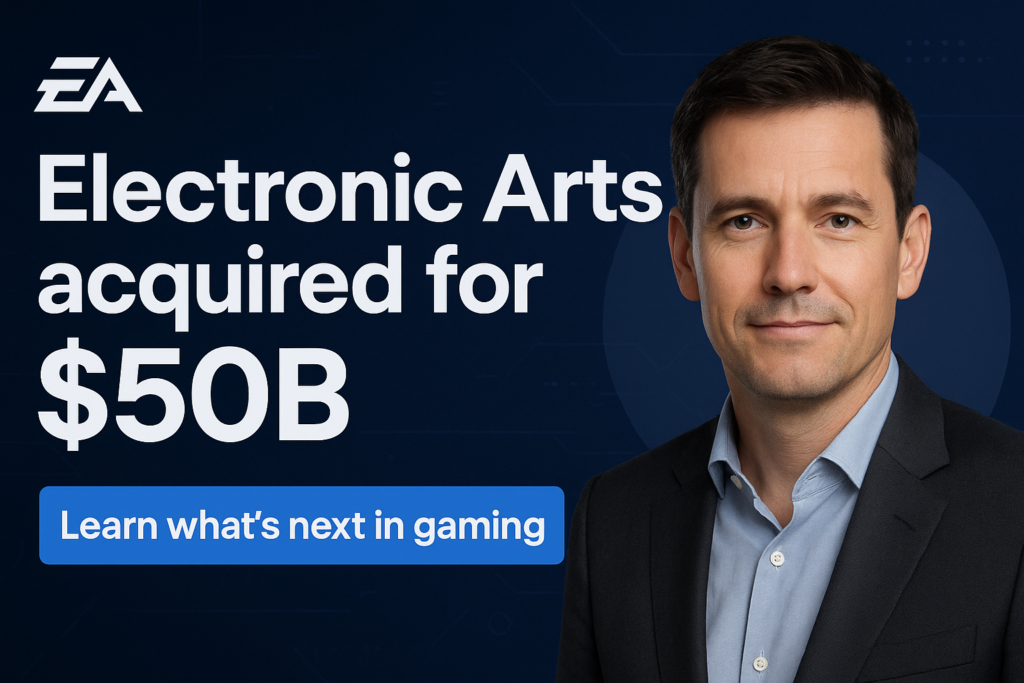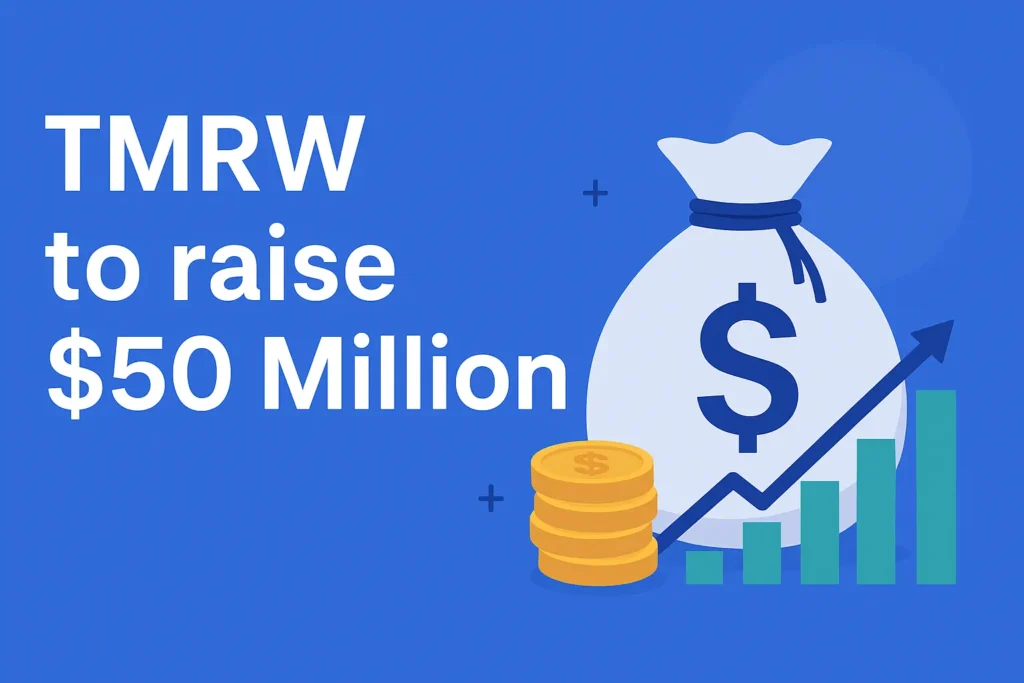The gaming industry confronts its most transformative moment as Electronic Arts approaches a watershed $50 billion acquisition that fundamentally reshapes interactive entertainment’s landscape. This monumental transaction transcends corporate restructuring—it signals gaming’s evolution into a premium asset class commanding unprecedented institutional respect and geopolitical significance.
Electronic Arts Stock Surges 15% After Historic Buyout News
Financial markets erupted with explosive enthusiasm following Electronic Arts’ potential acquisition announcement, catapulting the company’s stock price 15% in extraordinary trading volumes that exemplified investor confidence in this revolutionary deal. This dramatic surge reflects profound market recognition that the EA buyout transcends typical corporate acquisitions, positioning Electronic Arts at entertainment industry consolidation’s apex. Trading activity reached extraordinary levels as institutional investors validated gaming’s emergence as a cornerstone asset class commanding premium valuations traditionally reserved for established infrastructure investments. The immediate market reaction underscores this transaction’s exceptional significance in reshaping how global capital perceives gaming industry strategic value.
Saudi Arabia’s $50B Gaming Investment Plan Transforms Industry Dynamics
Saudi Arabia’s Public Investment Fund emerges as gaming’s most formidable transformative force, wielding massive financial resources to execute comprehensive strategy positioning the Kingdom as gaming’s new global epicenter. The PIF’s EA acquisition involvement represents culmination of a broader $50 billion gaming investment initiative reshaping industry ownership through strategic acquisitions across multiple sectors. This methodical approach reveals sophisticated understanding that gaming serves as cultural infrastructure with geopolitical implications extending beyond entertainment value. The Saudi gaming investment strategy demonstrates unprecedented sophistication, with PIF already securing significant Electronic Arts stakes while simultaneously acquiring major gaming companies worth billions, cementing games as critical assets for global influence comparable to sports or film industries.
Largest Leveraged Buyout in Wall Street History Breaks Financial Records
The EA acquisition stands poised to shatter historical precedents by establishing itself as Wall Street’s largest leveraged buyout ever, fundamentally altering financial markets’ perception of gaming companies’ valuation potential. This record-breaking transaction represents more than statistical achievement—it signals profound transformation in sophisticated investors’ approach to gaming industry opportunities. The $50 billion EA buyout exemplifies convergence of traditional private equity methodologies with cutting-edge entertainment technology, creating unprecedented value propositions attracting institutional capital on previously unimaginable scales. If completed, this deal would surpass all previous leveraged buyout records, demonstrating gaming’s evolution into premium investment category commanding respect from world’s most sophisticated financial institutions.
Silver Lake Leads Historic Gaming Deal with Strategic Vision
Silver Lake’s leadership role demonstrates the private equity giant’s recognition that gaming represents the most compelling intersection of technology innovation and mass market appeal available to contemporary investors. The firm’s involvement brings sophisticated financial engineering expertise to transactions demanding both technological understanding and strategic foresight regarding gaming’s future trajectory. The Silver Lake consortium approach reflects deeper industry consolidation trends where established financial institutions recognize gaming’s unique position as both entertainment medium and technological platform. Advanced negotiations indicate imminent resolution, with the Silver Lake-led consortium including Saudi Arabia’s Public Investment Fund potentially announcing this transformative deal within days, showcasing unprecedented collaboration between American private equity expertise and sovereign wealth strategic vision.
Electronic Arts Going Private: Revolutionary Implications for Gaming Innovation
Electronic Arts’ transition to private ownership creates unprecedented opportunities for long-term strategic investment in emerging technologies without constraining quarterly earnings pressures that traditionally limit public gaming companies’ innovation capacity. This transformation grants EA flexibility for artificial intelligence and cloud gaming investments amid industry consolidation, enabling pursuit of transformative technological initiatives that public market pressures might otherwise discourage. Private ownership typically enables aggressive research and development investment while allowing longer development cycles for ambitious gaming projects. The EA acquisition positions the company to lead gaming industry evolution through AI integration, cloud infrastructure development, and immersive technology advancement redefining interactive entertainment standards for decades.
Business model of Electronic Arts
| Category | Electronic Arts (EA) Analysis |
|---|---|
| How Company Started | Founded in May 1982 by former Apple employee Trip Hawkins, who worked as director of strategy and marketing at Apple. Started with $5,000 borrowed from his father for his first gaming venture as a teenager. Pioneered early home computer game industry and promoted designers as “software artists”. Initially focused on creative recognition for developers, placing designer names prominently on game covers. |
| Present Condition | Generated net revenue of $7.56 billion in fiscal year 2024, marking 6% increase and best annual result ever. Global leader in digital interactive entertainment with headquarters in Redwood City, California. Live services segment generated $5.55 billion in FY2024, representing 73% of total revenue. Currently facing labor strikes from SAG-AFTRA over AI protections and lowered 2025 revenue forecast due to underperformance of EA Sports FC 25 and Dragon Age. |
| Future of Company & Industry | Positioned for accelerated growth through sports gaming dominance and live service expansion. Gaming industry consolidating with $50B acquisition discussions involving Saudi PIF and Silver Lake. Industry trending toward AI integration, cloud gaming, and subscription models. EA focusing on bigger franchises, live services, and global sports licensing. Virtual reality and metaverse integration becoming critical competitive factors. |
| Opportunities for Young Entrepreneurs | Game development tools democratization enabling indie creators. Mobile gaming market expansion in emerging economies. Esports infrastructure and tournament platforms. AI-powered game development and personalization tools. Blockchain gaming and NFT integration services. Gaming accessibility solutions for disabled players. Cross-platform gaming technology solutions. |
| Market Share | World’s second-largest gaming publisher by revenue after Activision Blizzard. Dominates sports gaming with FIFA/EA Sports FC, Madden NFL, and NHL franchises. Leading position in battle royale with Apex Legends. Strong presence in mobile gaming and live services. Controls significant PC gaming market share through Origin platform and EA Play subscription service. |
| MOAT (Competitive Advantage) | Exclusive sports licensing agreements (FIFA, NFL, NHL) creating insurmountable barriers. Massive established franchises with decades of player loyalty (The Sims, Battlefield, Mass Effect). Live services representing 73% of net bookings providing recurring revenue streams. Advanced game engine technology (Frostbite) and development infrastructure. Global publishing and marketing capabilities. Established relationships with console manufacturers. |
| How Company Makes Money | Live Services (73% of revenue): In-game purchases, battle passes, downloadable content, subscriptions. Full Game Sales: Premium game releases across PC, console, and mobile platforms. Sports Franchises: Annual franchise releases with updated rosters and features. EA Play Subscription: Monthly/annual subscription service. Mobile Gaming: Free-to-play games with microtransactions. Licensing: Third-party licensing of EA sports brands and technology. |

My Name is Adarsh and I am Empowering startups with high-quality content at Startups Union and bridging the gap between brand stories.




